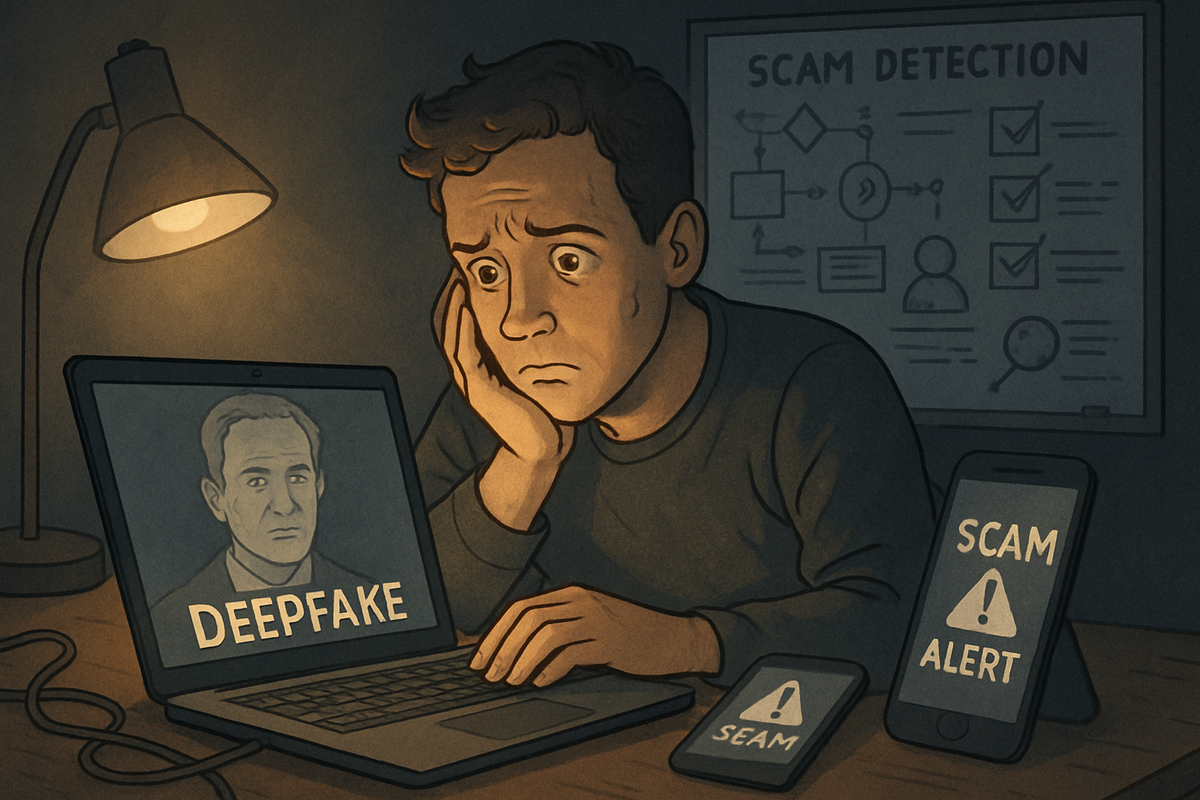Scam-Proof 2025: The Ultimate Guide to Outsmarting Deepfakes, AI Swindles & Digital Fraud
Arm yourself against 2025's AI scams with our survival manual—your essential guide to spot deepfakes, dodge job hoaxes, and thwart investment traps. Stay updated, stay smart, and scam-proof your digital life today.

Updated: August 4, 2025
Welcome to the AI-Scam Survival Manual
Congratulations! You’ve just stumbled upon your new digital shield—the only guide you’ll ever need to dodge, outwit, and (dare we say) laugh at the scammers of the AI era. Deepfakes, voice clones, job hoaxes, and investment traps—2025’s scam scene is wilder than a reality show hosted by robots. But with the right tools and a healthy dose of scam literacy, you can confidently surf the web without falling for digital trickery.
"We’ve entered an era where anyone with a laptop and access to an open-source model can convincingly impersonate a real person. It’s no longer about hacking systems—it’s about hacking trust."
— Brian Long, CEO of Adaptive Security
Table of Contents
- The 2025 AI Scam Landscape
- Spotting Deepfakes & AI Scams: Pro Strategies
- Real-World Scam Stories: Don’t Be the Next Victim
- Your 2025 Scam-Proof Toolkit
- Practical Scam-Proofing Checklist
- Legal Recourse & New Regulations
- Quick Scam Literacy Quiz
- Join the Scam-Savvy Community
1. The 2025 AI Scam Landscape: What’s New, What’s Scary
The days of misspelled emails from mysterious princes are over. Today’s scams are powered by AI, and they’re chillingly convincing. Here’s what you’re up against:
- Deepfake Videos & Voice Clones: Hyper-realistic media impersonating CEOs, government officials, or even your grandma. (Sorry, Nana.)
- Fake Job Offers: Scammers use AI-generated identities to apply for jobs, access business networks, or trick HR into wiring funds.
- AI-Driven Investment Frauds: Deepfake videos of celebrities or business icons (looking at you, Elon Musk) promising outrageous returns.
- AI-Powered Phishing: Chatbots and email generators that perfectly mimic writing style, logos, and even your boss’s favorite emojis.
- Social Engineering on Steroids: AI analyzes your digital footprint to craft scarily personalized scams—think ‘Netflix for fraudsters.’
Fact: Deepfake content is projected to skyrocket from 500,000 in 2023 to 8 million in 2025. (Source: TechRadar)
2. Spotting Deepfakes & AI Scams: Pro Strategies
How to Tell What’s Fake (Without a PhD in Computer Science)
- Look for “Uncanny Valley” Signs: Odd blinking, unnatural skin texture, or robotic voice tone? Red flag.
- Verify with a Second Source: Got a strange request from your CEO or a government official? Call them on a known number. No one ever got fired for double-checking.
- Trust Your Gut—But Check Your Facts: If it feels too urgent, emotional, or lucrative, pause. Scammers love triggering panic or greed.
- Reverse Image & Audio Search: Tools like Google Reverse Image Search or AI-powered deepfake detectors (see toolkit below) can expose fakes.
- Watch for Contextual Inconsistencies: Does the person in the video mention events that haven’t happened, or use language that’s off-brand?
Pro tip: AI scam detection is a moving target. Stay updated—and don’t be afraid to ask for a second opinion from a tech-savvy friend or trusted colleague.
3. Real-World Scam Stories: Don’t Be the Next Victim
- Voice Clone Ransom: A scammer cloned the voice of a CEO to order an urgent wire transfer. The finance team, convinced by the familiar tone, lost $200,000. (Source: AP News)
- Fake Biden Robocall: AI-generated audio of President Joe Biden urged voters to skip an election. Many believed it—until the real Biden debunked it on live TV.
- Job Offer Gone Rogue: Thousands of North Korean IT workers are using deepfake identities to get hired remotely, then installing ransomware or stealing secrets.
- Celebrity Investment Scams: Deepfakes of Elon Musk promoting fake crypto coins have lured investors worldwide. Spoiler: He’s not giving away free Bitcoin.
"Think you’re too smart to be caught by scammers? Think again. The latest AI scams are sophisticated, relentless, and no one is immune."
— Nick Stapleton, Investigative Journalist (FT)
4. Your 2025 Scam-Proof Toolkit
Top AI/Deepfake Detection Apps & Services
- Norton Deepfake Protection: Now on mobile, scans YouTube videos for fakes and flags suspicious content in real time.
- McAfee Scam Detector: Bundled with antivirus; analyzes links, emails, and attachments for scam signals.
- Avast AI Scam Shield: Free tool to analyze suspicious media and flag deepfake attempts.
- Bitdefender Digital Identity Protection: Monitors for identity theft and scam attempts.
- 1Password/LastPass: Password managers that help prevent account takeovers from phishing.
Essential Cyber Hygiene Habits
- Use strong, unique passwords for every account (use a manager, not your memory!)
- Enable two-factor authentication (2FA) everywhere possible
- Update software and devices regularly—patches close security holes
- Never share personal info over email, text, or phone—unless you’ve initiated the conversation
- Be wary of urgent requests, especially involving money or sensitive data
5. Practical Scam-Proofing Checklist
- Verify identities via a second channel (e.g., call, video chat, or in-person meeting)
- Inspect emails and links for tiny errors in spelling, grammar, or sender address
- Double-check job offers and business requests—especially if they seem too good to be true
- Educate your team, family, and friends—scam literacy is a group sport!
- Report suspicious activity to your bank, IT department, or a trusted scam reporting platform immediately
6. Legal Recourse & New Regulations (U.S. & Global)
Good news: Regulators are catching up! Here’s what’s changed in 2025:
- U.S. Take It Down Act: Criminalizes non-consensual deepfake porn and requires platforms to remove it within 48 hours. (Passed April 2025)
- FTC Enforcement: Platforms must respond to flagged deceptive content or face steep penalties.
- Global Push: The EU and UK are rolling out new digital safety laws, focusing on AI-generated harms and platform accountability.
If you’re targeted by a scam, document everything (screenshots, emails, phone numbers), report it to authorities, and seek legal advice if personal or business losses occur.
7. Quick Scam Literacy Quiz (Are You Scam-Proof?)
- Would you click a link promising “guaranteed crypto returns” from a celebrity?
- If your boss texts you urgently for gift cards, do you respond or call to confirm?
- Can you spot a deepfake video if the person’s eyes don’t blink naturally?
- Do you use unique passwords for every online account?
- Have you ever checked a suspicious job offer on LinkedIn or with the company directly?
If you answered “no” or “not sure” to any of these, bookmark this guide and consider yourself on the road to scam-proofing greatness!
8. Join the Scam-Savvy Community
Want more actionable tips, expert interviews, and the latest scam alerts delivered straight to your inbox? Subscribe to our blog for free—and unlock exclusive perks as a Funaix Insider! Only subscribers can read and write comments, join our smart community discussions, and get early access to scam-proofing resources. (Psst… subscribing is free, for now. Don’t wait!)
Stay smart, stay skeptical, and remember: in the age of AI, trust is your best currency.
— The Funaix Team, August 2025




